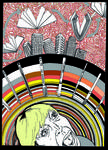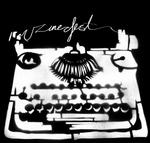Zines: Scrambled documents for a choatic age?
type=blog
Everyone at Camp GF (Grassroots Feminism) is extremely busy at the moment, reading, writing, thinking, and ferreting for precious examples of grassroots media in Europe, so first of all, please forgive us for falling behind in blog entries.
We wanna share with you some of the places we've been and what we've been up to and how we think about contemporary feminist media. First up is the ZineFest! Red organized at the Women's Library in London at the beginning of the year.
Now, zines are a particularly favourite form of media for us. I think it has something to do with the immediacy of the format: that you can literally scribble onto a sheet of paper, photocopy it, fold it up, add a ribbon or an ink stamp or some cut and paste, and wham bam, you've become a publisher. Zines hold the promise of a more democratic, innovative, fun form of print media, which you can put in your pocket, send to sweethearts, trade for other DIY creations, and learn a hell of a lot from. I would say a lot of my thoughts about things, especially about activism, are shaped through zines and the personal experiences and reflections of the amazing folk who make them.
So, zines. They can be on any topic, in any format, and with any style. That's a beautiful concept to behold. There's also the inherent tendency within zines to also run the risk of being mundane and self-absorbed. But sometimes its horses for courses, and what might leave you cold, might bust someone else into a smile, or a common moment of recognition, or even a motivating 'I can do better than this rubbish!' which keeps people making as much as inspiration and creative cravings seem to do.
I'm also interested in zines as a historical curiousity. Sure, we've had self-publishing as long as we've had technology - or the impetus to express something through print in the public domain - but zines are also mutated documents which have developed their own idiosnycracies, and have shifted alongside the technology that makes more and more DIY communication possible (for example, mimeographs, typewriters, off-print litho, PDFS, Photoshop, Quark, Biro Pens, Photocopiers, Ink Stamp Alphabets, Transfers etc).
I see zines as postmodern publications- with their cut and paste rejuvunation in punk rock scenes (but then this is well documented, I know less, for example, about rap and hip hop zines and what aesthetics fuelled these publications around a similar time...). Zines become scrambled documents, which mess with linearity and (off-)grid layouts, and embrace the art of the doodle, the crossing out, the mistake, and the accidental.
Maybe in my head postmodern is also equivicated with informal, multiple, chaotic, decentred- and all these other kind of buzz words. Zines sometimes offer a glimpse of the unruly and where psychic power meets social convention (or not). I am a sucker for per-zines, those zines which take critical introspection, musing on experience and its connection to the broader system of things. Especially per-zines which focus on trauma in some way: survivor stories of sexual abuse, of mental health, or self-harm, or any of the myriad strong, complicated stories we tell, both to make sense of our lives and to connect with others. The role of the confessional within zines cannot be disputed - and this has become more and more embraced within late capitalism, even exalted in pop culture (alongside reality tv, etc).
But, anyways, with ZineFest, it was important to me to organize something which fused practical skill-share sessions, with beautiful displays of comic art, with discussions about zine themes (such as queer), with connections to radical women of the second wave and beyond who also claimed their place in self-publishing. Because zines are also more than just ego and triviality, they are also incredibly powerful documents and a strong form of social movement media.
Here's some piccies of the day, and a recording from a brilliant panel with third and second wave publishers talking about their projects and motivations. And, of course, there's also a zine we made during the day for you to digest. If you think it's rubbish, you know what to do, make your own!
(and on that note, remember to check out the online zine archive we have on this site- go to the 'archives' tab at the top of the page, and you're find some treasures...please add your own PDFs and help this zine library grow!)
much love and pritt stick, a self-confirmed zine fanatic xx
ZineFest programme, http://www.myspace.com/zinefest
Recording of Women's Media Collectives panel discussion with Jess (See Red Poster making collective), Melissa (Cherrybomb Comics), and Rahila (Outwrite women's internationalist newspaper). Listen here,
http://www.archive.org/details/ZineFest09
Plus, more zine-related articles:
Wor diary: a case of DIY alternative history
www.interfacejournal.net/2009/01/wor-diary-case-of-diy-alternative.html
Transnational networks of everyday feminist practices: From Grrrl Zine Network to Grassroots Feminism. Zehar Nr. 64. Arteleku (ed). San Sebastian, Spain, 2008: 90 – 101.
http://www.arteleku.net/4.1/blog/zehar/wp-content/uploads/2009/01/zobl_e...
- redchidgey's blog
- Login or register to post comments















